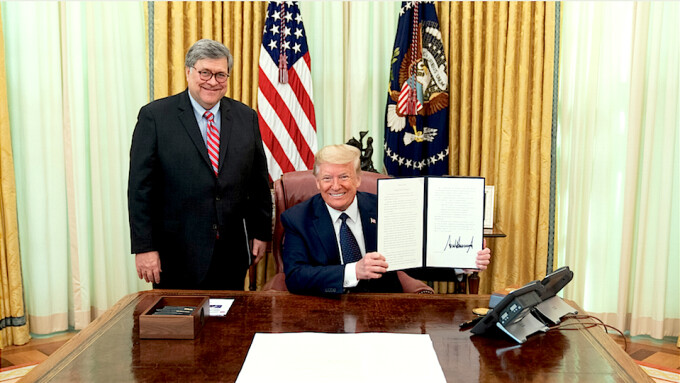WASHINGTON — As part of an order revoking a number of former President Donald Trump’s executive orders, President Joe Biden rescinded last Friday his predecessor’s controversial May 2020 order calling for the repeal of Section 230, the so-called “First Amendment of the internet.”
This is a noteworthy development, since Biden, as a presidential candidate, had also expressed interest in repealing Section 230.
However, as XBIZ reported last year, Trump’s unusual, hastily drafted executive order was less a policy position than a direct reaction to initial attempts by Twitter to fact-check his statements early on during the 2020 presidential campaign.
News wire service Reuters, at the time, described the executive order as “an extraordinary attempt to intervene in the media that experts said was unlikely to survive legal scrutiny.”
The executive order, Reuters reported, attempted “to circumvent Congress and the courts in directing changes to long-established interpretations of Section 230.”
A Controversial Take on 'Online Censorship'
Trump’s May 2020 "Executive Order on Preventing Online Censorship” also ordered “a review of alleged 'unfair or deceptive practices' by Facebook and Twitter and calls on the government to reconsider advertising on services judged to 'violate free speech principles.'"
Trump also called for the Federal Communications Commission (FCC) to propose regulations for Section 230. It asked the FCC to "examine whether actions related to the editing of content by social media companies should potentially lead to the firms forfeiting their protections under Section 230."
XBIZ spoke then with industry attorney Lawrence Walters, a First Amendment expert, who described Section 230 as “critical for online innovation and free expression," and called Trump’s executive order “a shot across the bow of the tech companies, warning them against unfair manipulation of the marketplace of ideas occurring in social media.”
“There are significant First Amendment concerns with any governmental effort to regulate online speech,” Walters added, pointing out that “any order impacting Section 230 immunity will likely be challenged in court. Ultimately, Congress is the only body that can alter the broad protections granted by Section 230.”
The EFF Weighs In
Biden’s revocation, according to digital rights group Electronic Frontier Foundation (EFF), follows a call to do so by a coalition of organizations challenging the order in court.
Organizations including Rock The Vote, Voto Latino, Common Cause, Free Press, Decoding Democracy and the Center for Democracy & Technology, the EFF noted, demanded the Executive Order’s rescission, claiming the impetus behind it was "to punish online platforms that fact-checked President Trump.”
Last year, several organizations filed lawsuits to strike down Trump’s executive order. The challenge is currently on appeal in the Ninth Circuit; an appeal of yet another challenge is currently pending in the D.C. Circuit.
Cooley LLP, Protect Democracy and EFF represent the plaintiffs in the Ninth Circuit appeal.
“We applaud Biden’s revocation of the ‘Executive Order on Preventing Online Censorship,’” the EFF stated, “and are reviewing his rescission of the order and conferring with our clients to determine what impact it has on the pending legal challenge in the Ninth Circuit.”








